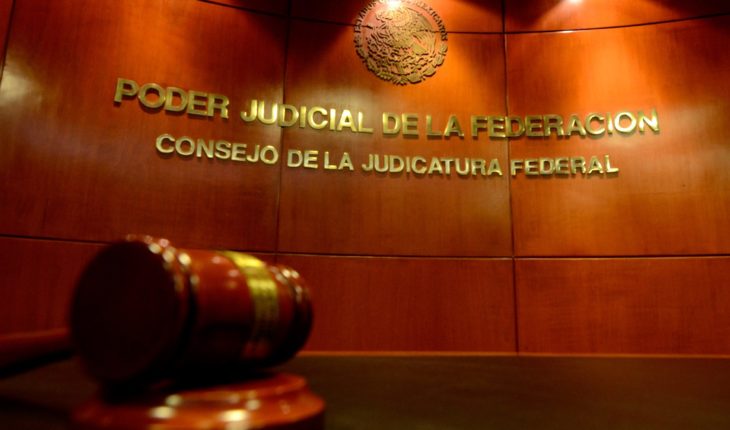The Attorney General’s Office and the federal government will present on Wednesday a package of nine initiatives and reforms that, according to the drafts they passed yesterday, seek to expand the rooting of all crimes, eliminate the judges who today are responsible for assessing the legality of an arrest and evidence, as well as remove the prohibition that exists to intervene communications in electoral and fiscal matters.
It also seeks, among many other changes, to amend the constitutional clause that automatically considers evidence that has been obtained illegally to be null and void.
The initiatives raise the further transformation of the justice system in Mexico since the criminal reform passed in 2008 and, in fact, amend several of the provisions that had been adopted since then.
Read: They will create a pattern of judges’ relatives to avoid nepotism on the Council of the Judiciary
What is sought, according to the grounds put forward in the initiatives, is to maintain the positive aspects of the current criminal penal system, but in turn to correct the alleged lack of balance between the rights of victims and accused; seek more effective justice; and reduce impunity.
To this end, multiple changes are made to the Political Constitution, to the Law on Amparo, to the National Law on Criminal Execution, to the National Law of the Integral System of Justice for Adolescents, to the Organic Law of the Judiciary of the Federation.
It is also proposed to repeal the current National Code of Criminal Procedures and the formulation of a new one, the formulation of the country’s first National Criminal Code, and the issuance of the National Law on Culture and Civic Justice and a new Organic Law of the FGR.
Specialists such as those of the #FiscalíqueSirva collective have been pushing the risk of a reversal of these initiatives since yesterday, which would even mean a “counter-reformation” for the advancement of the indictment system in recent years.
Read: State prosecutors handle crime data and fail in their record
The leader of the Morena bench in the Senate and chairman of the Political Coordination Board, Ricardo Monreal, asked on his Twitter account to wait to know in detail the initiatives that will be presented and not speculate. He assured that they will act “with responsibility and openness, without regression or affecting fundamental rights”.
Hardening the system
The proposed changes, in accordance with drafts that have been transcended yesterday, raise the authorities’ capacities by investigating crimes through measures such as expanding entrenched ness for all crimes, and not just for organized crime as it currently is.
The only limitising period is that such an entrenchment period may not exceed 40 days under any circumstances.
The power of the Public Prosecutor’s Office and the police to order arrests in flagrance is maintained, but also in cases that are considered “urgent” on the condition that persons are immediately made available to a judge. These arrests without a warrant will be appropriate for all new offences that already warrant unofficial pre-trial detention.
A new concept called “presumption of responsibility” which will apply to any person who refuses to have expertise practiced, which would mean that he accepts the possible facts alleged against him.
An amendment to constitutional article 16 seeks to remove the restriction that currently exists in order to be able to ask a judge to intervene private communications in tax and electoral matters. The prohibition would only be maintained for civil, commercial, labour and administrative matters.
Moreover, an amendment to section IX of constitutional Article 20 is proposed, which considers as null the evidence obtained by the violation of fundamental rights. Instead it is proposed that they may be considered valid if there are “mitigating” about their nature as illegality.
It also intends to restore to the prison authorities the power to determine transfers of inmates without requiring the authorization of a judge, as is currently the case.
In the same way, prison work is a mandatory requirement to access any kind of pre-liberation benefit.
Remove control judges; Senate responsible for appointing them
One of the most relevant aspects of the initiatives proposed, according to the drafts, is the elimination of the figure of the supervisory judges who are currently exclusively responsible for assessing the legality of an arrest at the initial hearings, as well as of studying the legality or not of the evidence at an interim hearing, all prior to the trial.
Read: Morena pushes for reform of the judiciary, these are the five key points of her initiative
It also raises the elimination of the process-linking figure currently issued by the supervisory judges.
Instead, a model similar to that in the previous criminal system is proposed, where a single judge can be responsible for the entire process: from the initial investigation, to the assessment of the arrest and the trial phase.
On the other hand, the reform says that it is the Senate of the Republic that assumes the power to appoint judges and magistrates, thereby seeking to eliminate “favouritism” and “private assignments”. Currently the appointment of judges is the power of the same Judiciary.
Criminal Code and National Civic Justice Act
Another central issue in the draft FGR and the Executive is to empower Congress to issue the country’s first National Criminal Code.
This code will establish a catalogue of crimes and sanctions approved for the whole country, thus eliminating the discrepancies that exist as a result of the existence of 32 different state criminal codes. Likewise, the catalogue of illegals that will be exclusively the responsibility of the Federal Prosecutor’s Office will be defined in this code.
The National Penal Code will not be a single code as the power of local congresses to legislate on illegal facts and sanctions that are outside the national catalogue will be maintained. An example of this would be abortion that would fall outside the National Code, but could be considered a crime by state codes that deem it appropriate.
The existence of the National Penal Code would give clarity to the definitions of some serious illicits such as femicide, where the clauses to typify them today vary from entity to entity.
The reform also proposes the issuance of the first National Law on Culture and Civic Justice that would establish at least the principles, violations, procedure, basic structure of the civic courts, participating authorities and bases to which civic justice must be subject in all municipalities of Mexico.
What we do in Animal Político requires professional journalists, teamwork, dialogue with readers and something very important: independence. You can help us keep going. Be part of the team.
Subscribe to Animal Politician, receive benefits and support free journalism.#YoSoyAnimal
translated from Spanish: FGR and AMLO go through more roots, espionage and judge reduction
January 15, 2020 |





